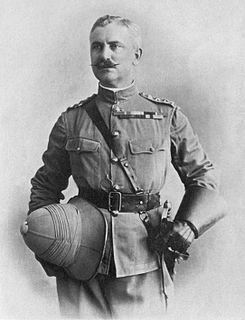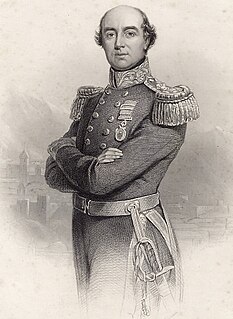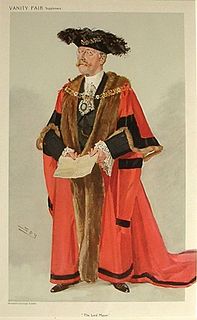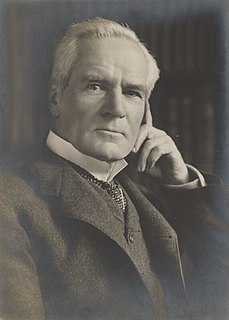Related Research Articles

A baronet or the rare female equivalent, a baronetess, is the holder of a baronetcy, a hereditary title awarded by the British Crown. The practice of awarding baronetcies was originally introduced in England in the 14th century and was used by James I of England in 1611 as a means of raising funds.
Baron Derwent, of Hackness in the North Riding of the County of York, is a title in the Peerage of the United Kingdom. It was created on 10 October 1881 for the former Liberal Member of Parliament for Scarborough, Sir Harcourt Vanden-Bempde-Johnstone, 3rd Baronet. His grandson, the third Baron, was an author, poet and minor diplomat. On his death in 1949 the titles passed to his younger brother, the fourth Baron. He served in the Conservative administrations of Harold Macmillan and Sir Alec Douglas-Home as Minister of State for Trade and Minister of State for Home Affairs. As of 2010 the titles are held by his son, the fifth Baron, who succeeded in 1986.

There have been three baronetcies created for persons with the surname Booth, one in the Baronetage of England and two in the Baronetage of the United Kingdom. The 1916 creation remains extant, the 1835 creation became extinct in 1896 and the 1611 baronetcy has been dormant since 1797. The senior line of the first creation was elevated to the peerage as Baron Delamer and Earl of Warrington.

Lieutenant-Colonel Sir John Gilmour, 2nd Baronet was a Scottish Unionist politician. He notably served as Home Secretary from 1932 to 1935.

General Sir Francis Reginald Wingate, 1st Baronet, was a British general and administrator in Egypt and the Sudan. He earned the nom de guerre Wingate of the Sudan.
The Mount baronets are a family with a baronetcy in the United Kingdom.
Nineteen baronetcies have been created for persons with the surname Hamilton, eight in the Baronetage of Nova Scotia, one in the Baronetage of England, five in the Baronetage of Ireland, one in the Baronetage of Great Britain and four in the Baronetage of the United Kingdom. As of 2008 two creations are extant, two are dormant, two are either extinct or dormant and twelve extinct.

The Wigan Baronetcy, of Clare Lawn in Mortlake in the County of Surrey and Purland Chase in Ross in the County of Hereford, is a title in the Baronetage of the United Kingdom. It was created on 9 March 1898 for Frederick Wigan, a Director of the North London Railway. The presumed 6th Baronet, listed in Debrett's Peerage (2015) as the son of the 5th Baronet, has not successfully proven his succession and is consequently not on the Official Roll of the Baronetage.
There have been two baronetcies created for persons with the surname Aykroyd, both in the Baronetage of the United Kingdom for members of the same family.

The Cradock-Hartopp Baronetcy, of Freathby in the County of Leicester and of Four Oaks Hall in the County of Warwick, was a title in the Baronetage of Great Britain. It was created on 12 May 1796 for Edmund Cradock-Hartopp, Member of Parliament for Leicestershire. Born Edmund Bunney, he was the husband of Anne Hurlock, granddaughter and heiress of Sir John Hartopp, 4th Baronet, of Freathby. On his marriage in 1777 he assumed the surname of Cradock-Hartopp in lieu of his patronymic according to the wills of his uncle Joseph Cradock and his wife's grandfather. His eldest surviving son Edmund, the second Baronet, died childless and was succeeded by his younger brother, William, the third Baronet. The title then descended from father to son until the death of his grandson, Charles, the fifth Baronet, in 1929.
There have been three baronetcies created for persons with the surname Bernard, one in the Baronetage of England, one in the Baronetage of Great Britain and one in the Baronetage of the United Kingdom. Two of the creations are extinct and one is extant.

There have been eleven baronetcies created for persons with the surname Robinson, four in the Baronetage of England, one in the Baronetage of Great Britain and six in the Baronetage of the United Kingdom. As of 2008 two of the creations are extant while one is dormant.

There have been twenty baronetcies created for persons with the surname Williams, eight in the Baronetage of England, three in the Baronetage of Great Britain and nine in the Baronetage of the United Kingdom. Only five of the creations are extant as of 2017..
There have been three baronetcies created for persons with the surname Lees, all in the Baronetage of the United Kingdom.

The Truscott Baronetcy, of Oakleigh in East Grinstead in the County of Sussex, is a title in the Baronetage of the United Kingdom. It was created on 16 July 1909 for Sir George Truscott. He was Chairman of Brown, Knight & Truscott, Ltd, printers and stationers, and served as Lord Mayor of London from 1908 to 1909. Truscott was the son of Sir Francis Wyatt Truscott, Lord Mayor of London from 1879 to 1880. As of 28 February 2014 the present Baronet has not successfully proven his succession and is therefore not on the Official Roll of the Baronetage, with the baronetcy considered dormant since 2001.

Sir Henry Craik, 1st Baronet, was a Scottish Unionist politician.
There have been four baronetcies created for persons with the surname Morris, all in the Baronetage of the United Kingdom. As of 2014 two of the creations are extant.
There have been three Baronetcies created for the family of Walker, later known as Forestier-Walker. The original title was in the Baronetage of England and the other two in the Baronetage of the United Kingdom. The earliest and the latest are both extinct, but one baronetcy is still extant.
Six baronetcies have been held by the Grant family.

There have been two baronetcies created for persons with the surname Congreve, both in the Baronetage of the United Kingdom. Both creations are extinct.
References
- ↑ "No. 33490". The London Gazette . 30 April 1929. p. 2849.
- ↑ "Honours List". The Mercury. Hobart, Tasmania: National Library of Australia (Online Archives). 2 March 1929. Retrieved 30 March 2016.
- ↑ An Almanack for the Year of Our Lord 1949 (81st edition), Joseph Whitaker, 1949, p. 297
- ↑ Wills, Walter H. (2006). The Anglo-African Who's Who and Biographical Sketchbook, 1907. London: Jeppestown Press. p. 110. ISBN 978-0-9553936-3-1.